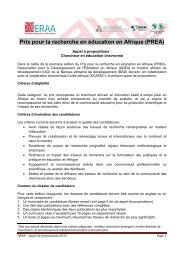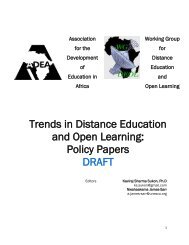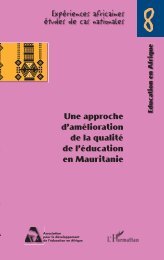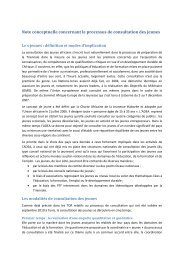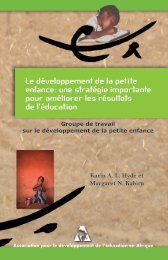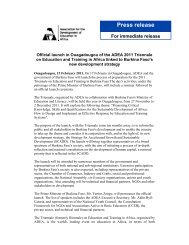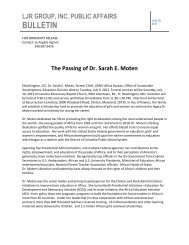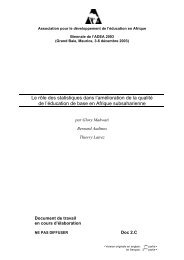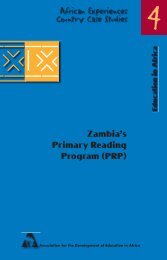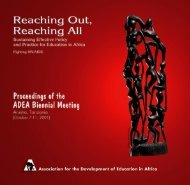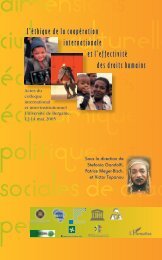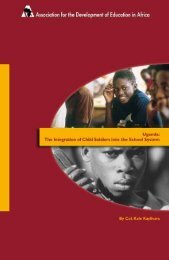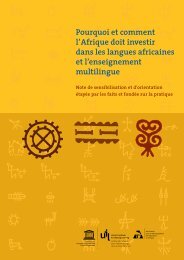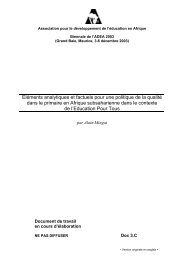Newsletter Vol.16 No.3 - ADEA
Newsletter Vol.16 No.3 - ADEA
Newsletter Vol.16 No.3 - ADEA
Create successful ePaper yourself
Turn your PDF publications into a flip-book with our unique Google optimized e-Paper software.
Conferences...Conferences...Conferences...Conferences...Conferences...ConferencMinisterial conference on educationin countries in crisis or post-conflict situationsMombasa, Kenya, June 2-4, 2004<strong>ADEA</strong>, in collaboration with theCommonwealth Secretariat organizeda conference on ‘Educationin Countries in Crisis or Post-Conflict’June 2-4, 2004 in Mombasa, Kenya. Theconference brought together Ministersof Education and Training from conflicttorncountries to explore the challengesof delivering education in conflict andcrisis circumstances in Africa. In additionto the 21 representatives fromministries, representatives of developmentpartners such as the World Bank,UNICEF, UNESCO, INEE (Inter-AgencyNetwork for Education in Emergencies)as well as FAWE and the <strong>ADEA</strong> WorkingGroups on Higher Education andCommunication for Education andDevelopment attended the conference.Objectives of the conference were to: Foster awareness and commitmenton the part of key actors withrespect to the educational challengesarising from conflicts in Africa;Share what has been learned fromthe education strategies, programsand projects developed in conflictsituations, from the standpoint ofboth national policy and externalaid; andPromote partnerships in analyticalwork, capacity building, financingand project development in favor ofeducation in situations of crisis andconflict.Three major issues were discussedduring the conference, namely conflictprevention, education in emergenciesand rebuilding education systems afterconflict.Before: conflict preventionPrevention concerns education policiesat a fundamental level: that of their meaningand their purpose. Above and beyondthe cognitive concerns, education policiesand models should promote appropriatevalues, attitudes and behavior inthe social and affective domain. In otherwords, as was discussed during the presentationsand discussions, the challengeis to transform school management, theteaching/learning process and the curriculumand to set up skills-oriented peaceprograms. In South Africa for example,a so-called ‘Values, Democracy andEducation Initiative’ has been set in motion,which can be seen as a reminder ofthe kinds of values to which one aspiresand which would influence the attitudeand skills of the learners.During: emergencieseducationWhen a country is torn by conflict, withthe disastrous consequences describedabove, delivery of educational servicesbecomes a difficult task owing to thelack of security for both property andpeople, displaced populations andrefugees. This does not, however, justifythe suspension of the right to education,because the need for education is moreurgent than ever for children and youngadults facing grave psychological andsocial problems, serious risks to theirhealth and the vicious circle of hatred,vengeance and wanton acts of destruction.In this regard the Inter-AgencyNetwork for Education in Emergencieshas created a Working Group onMinimum Standards for Education inEmergencies that is facilitating the participationof a broad base of stakeholdersto develop standards that articulate theminimum level of educational serviceto be attained in emergencies, chroniccrises and early reconstruction.After: education reconstructionThis brings us to the challenge of rebuildingeducation systems in post-conflictsituations, something that came out ofa round table during the conference,and the importance of formulation andplanning of education policies througha national dialogue and with a view tosustainable development. The problemis not simply the shortage of financialand material resources, but also thatof technical and institutional capacity.Reconstruction of the education systemrequires a reform process affecting boththe structure, operation and managementof the system and the processesrelated to the attitudes and behavior ofstakeholders, as well as to their relationswith one another.At the end of the conference, theMinisters of Education signed theDeclaration of Mombasa, in which theyassert their strong will to use educationalsystems as institutions and forcesthat should strive for a world of peace,conflict prevention and resolution andconstructive nation-building.RecommendationsParticipants recommended that:Activities among all stakeholders,including civil society and donoragencies, should be coordinatedbetter;There should be more opportunitieslike the Mombasa conference for exchangingexperiences in the field.The following suggestions were alsomade:Set up a team of specialists in educationin emergencies and reconstruction.This should be a ‘soundingboard’, constituting a forum fordiscussion and exchange;Promote access to available informationvia website as well as printeddocuments;Conduct studies to document experienceswithin education in emergenciesand reconstruction; and Support an exchange programamongst African countries confrontedwith the same challenges.▼For more informationplease contact Joris van Bommel,Program specialist, <strong>ADEA</strong>j.vanbommel@iiep.unesco.orgThe Mombasa Declarationtogether with conferencedocuments can be downloadedfrom the <strong>ADEA</strong> website:www.adeanet.org<strong>ADEA</strong> <strong>Newsletter</strong> July - September 200421



